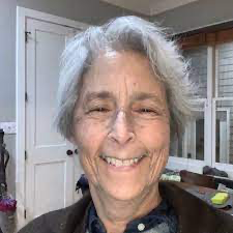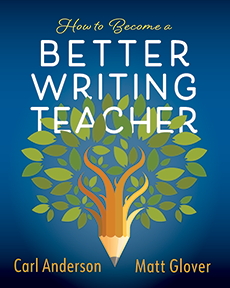How to Become a Better Writing Teacher
By Carl Anderson and Matt Glover
(Heinemann, 2024 – Learn more)
Reviewed by Elisa Waingort-Jiménez
 Carl Anderson and Matt Glover have written a book that not only teaches about how to be a better writing teacher, but also about how to be a better writer. I can’t think of a more powerful combination for a teacher professional book!
Carl Anderson and Matt Glover have written a book that not only teaches about how to be a better writing teacher, but also about how to be a better writer. I can’t think of a more powerful combination for a teacher professional book!
How to Become a Better Writing Teacher is well-written, easy to follow and describes precise teacher actions that support students to become better writers. As a long-time advocate and practitioner of the writing workshop approach to teaching writing, I discovered new ways to focus my teaching on specific writing moves of craft and genre.
 The authors emphasize that intentional planning is critical to becoming a better writing teacher. This comes from knowing students as individuals and their writing well enough to know when and how to teach what they need at any given moment. The what and the how are described in the individual actions in each chapter with anecdotal examples and online videos demonstrating those actions.
The authors emphasize that intentional planning is critical to becoming a better writing teacher. This comes from knowing students as individuals and their writing well enough to know when and how to teach what they need at any given moment. The what and the how are described in the individual actions in each chapter with anecdotal examples and online videos demonstrating those actions.
Teachers know only too well that time is a precious commodity, and time has become even more scarce since the pandemic. The increased teacher workload and the rise in student complexities show no signs of slowing down.
Yet the authors make it clear that without intention behind our planning, our teaching will fall short of what we envision our students require to become better writers. Therefore, the time it takes for careful planning is non-negotiable.
Focusing writing instruction on students
Fortunately, Carl and Matt share actions that are small and doable yet powerful enough to support teachers and students. Their intent is to assist teachers as we make our writing instruction more focused on our student writers. The actions described in this book help us tweak our teaching to make a greater impact.
The authors encourage teachers of writing to pay attention to our own writing process and the strategies we use in order to help students confront obstacles in their own writing. If teachers don’t write, then we won’t be able to anticipate students’ writing challenges or be able to support them as writers.
A thorough look at eight strategies
Each chapter in the book starts with the why and what of one of the eight topics Carl and Matt address:
- getting to know students as people and writers
- creating conditions for student engagement
- developing a repertoire of teaching points
- becoming a curriculum decision-maker
- helping students learn from mentor authors
- individualizing instruction
- teaching clearly and precisely
- supporting student independence
After describing the why and what or how of each topic, the authors go on to highlight a series of actions that teachers can take to improve their teaching of writing for their students.
The actions the authors recommend are described in nuanced ways and build on each other. Although it’s not necessary to read How to Become a Better Writing Teacher from cover to cover, it is so well-written and contains so many useful teaching moves that it is well worth a reader’s time to do a deep dive into the book. (Download a sample chapter here.)
Throughout each chapter there are Q&A sidebars that address both common concerns teachers have regarding particular actions and how to attend to these matters in a constructive way in the classroom. In addition to the online videos, Q&A sidebars, and suggestions for further reading, the authors have provided many sample checklists and observation and record keeping forms that can be downloaded from the publisher’s website.
My copy of the book has many annotations wedged into the margins and in the body of the text, and yours will, too. There is so much here to be delighted with as a teacher of writing. I hope you will agree after you’ve taken your own reading journey through How to Become a Better Writing Teacher. Enjoy!
Elisa Waingort has been teaching in bilingual settings for more than 30 years in public and international schools in North and South America and has long been active in leadership roles in the National Council of Teachers of English (NCTE). Now living in Calgary, Alberta, Canada, she is currently a grades 4 & 5 Spanish bilingual teacher with the Calgary Board of Education. Elisa blogs at A Teacher Musing Out Loud. Her professional Twitter handle is @elisaw5, and at Bluesky find her @elisaw5.bsky.social.


